Businesses strive to capture the attention of potential customers. Search advertising stands out as a powerful tool, offering targeted visibility and measurable results. For small business owners, entrepreneurs, and marketers, mastering Pay-Per-Click (PPC) campaigns, keyword bidding strategies, and ad campaign management can unlock new growth opportunities.
This comprehensive guide aims to demystify search advertising by exploring its significance, offering actionable insights into keyword bidding strategies, and providing best practices for effective ad campaign management. Whether you’re new to PPC or seeking to refine your approach, this article will equip you with the knowledge to make informed decisions and maximize your return on investment (ROI).
The Importance of Search Advertising in Today’s Business Environment
Search advertising, also known as paid search or search engine marketing (SEM), allows businesses to place ads on search engine results pages (SERPs). Unlike traditional advertising, search ads target users who are actively searching for products or services, making them a highly effective marketing channel. Here’s why search advertising is crucial:
- Immediate Visibility and Traffic: Unlike organic SEO, which takes time to yield results, PPC advertising provides instant visibility. Ads appear at the top of SERPs, driving immediate traffic to your website.
- Targeted Reach: Search advertising allows businesses to target specific keywords, demographics, and geographic locations, ensuring that ads reach the right audience at the right time.
- Measurable Results: With PPC, you can track clicks, impressions, conversions, and more. This data-driven approach enables businesses to measure the effectiveness of their campaigns and make informed decisions.
- Cost Control: PPC offers flexibility in budget management. Businesses can set daily or monthly budgets, ensuring they only pay for actual clicks and can adjust spending based on performance.
- Brand Awareness: Even if users don’t click on your ads, appearing at the top of search results enhances brand visibility and credibility.
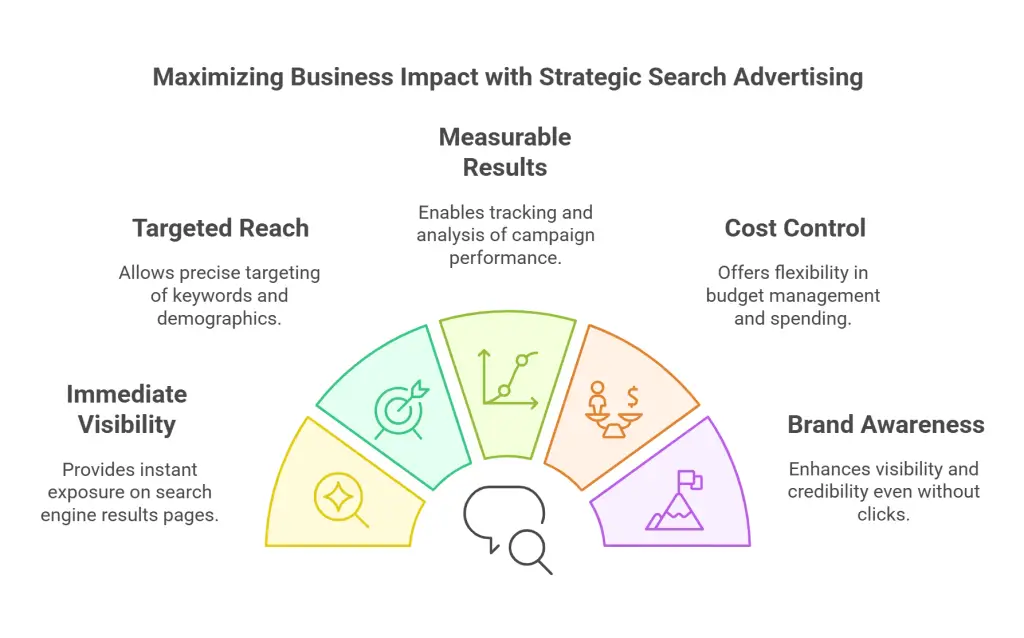
Understanding PPC Campaigns: An Overview
PPC campaigns are a cornerstone of search advertising. They involve paying for ad placements on search engines like Google, Bing, and Yahoo. Here’s how PPC campaigns work:
- Auction-Based System: When a user conducts a search, an auction takes place to determine which ads appear and in what order. Advertisers bid on keywords relevant to their business.
- Cost-Per-Click (CPC): Advertisers pay a fee each time someone clicks on their ad. The cost per click is influenced by the bid amount and the ad’s Quality Score.
- Quality Score: A metric used by search engines to assess the relevance and quality of ads. It considers factors such as click-through rate (CTR), ad relevance, and landing page experience.
- Ad Rank: Determined by the bid amount and Quality Score, Ad Rank decides the ad’s position on the SERP. Higher Ad Rank increases the likelihood of securing top ad positions.
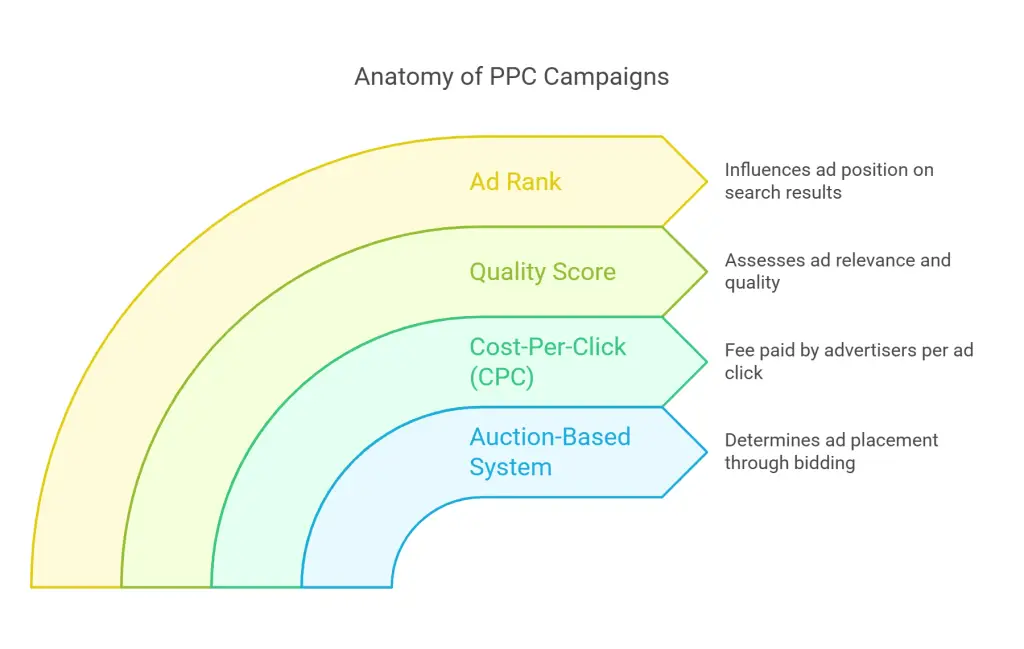
Crafting Effective PPC Campaigns: Best Practices
To create successful PPC campaigns, businesses need to focus on various elements, including keyword selection, ad copy, and landing pages. Here are some best practices:
- Keyword Research and Selection:
- Use keyword research tools (e.g., Google Keyword Planner, SEMrush) to identify relevant keywords.
- Focus on long-tail keywords, which are less competitive and often yield higher conversion rates.
- Regularly update your keyword list to align with changing trends and user behavior.
- Compelling Ad Copy:
- Craft clear and concise ad copy that highlights the unique selling points (USPs) of your product or service.
- Include a strong call-to-action (CTA) to encourage users to click on your ad.
- Test different ad variations (A/B testing) to determine which performs best.
- Optimized Landing Pages:
- Ensure landing pages are relevant to the ad and provide a seamless user experience.
- Use persuasive copy and visuals to engage visitors and drive conversions.
- Optimize landing pages for mobile devices to capture traffic from mobile users.
- Ad Extensions:
- Utilize ad extensions to provide additional information and improve ad visibility.
- Examples include site link extensions, call extensions, and location extensions.
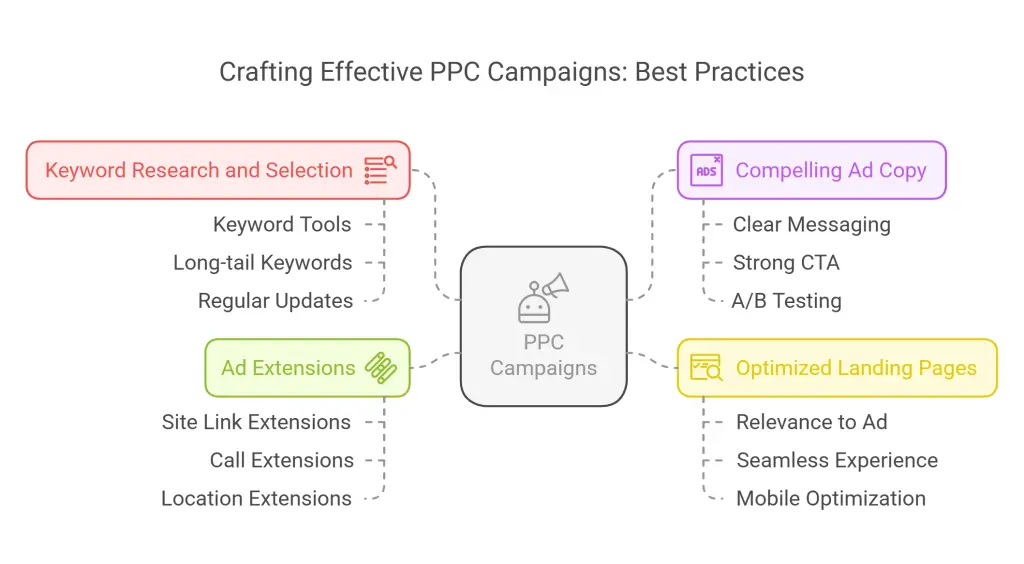
Keyword Bidding Strategies: Maximizing ROI
Effective keyword bidding is crucial to maximizing the ROI of your PPC campaigns. Bidding too high can quickly deplete your budget, while bidding too low may result in missed opportunities. Here are some keyword bidding strategies to consider:
- Manual vs. Automated Bidding:
- Manual Bidding: Allows advertisers to set bids for individual keywords. This provides greater control but requires more time and expertise.
- Automated Bidding: Relies on algorithms to adjust bids based on goals such as maximizing clicks or conversions. It saves time but may lack precision.
- Bid Adjustments:
- Adjust bids based on factors such as device type, location, and time of day to optimize ad performance.
- For example, increase bids for mobile users if your data shows higher conversion rates from mobile traffic.
- Target CPA (Cost-Per-Acquisition):
- Set a target CPA to focus on driving conversions within a specific cost range.
- Google Ads will automatically adjust bids to achieve the desired CPA.
- Enhanced CPC (Cost-Per-Click):
- Allows Google to increase or decrease your bids for clicks that are more likely to lead to conversions.
- This strategy can help improve conversion rates without exceeding your budget.
- Bid for Positioning:
- Bidding for top positions can increase visibility but may not always lead to higher ROI.
- Analyze data to determine which positions yield the best balance between cost and conversions.
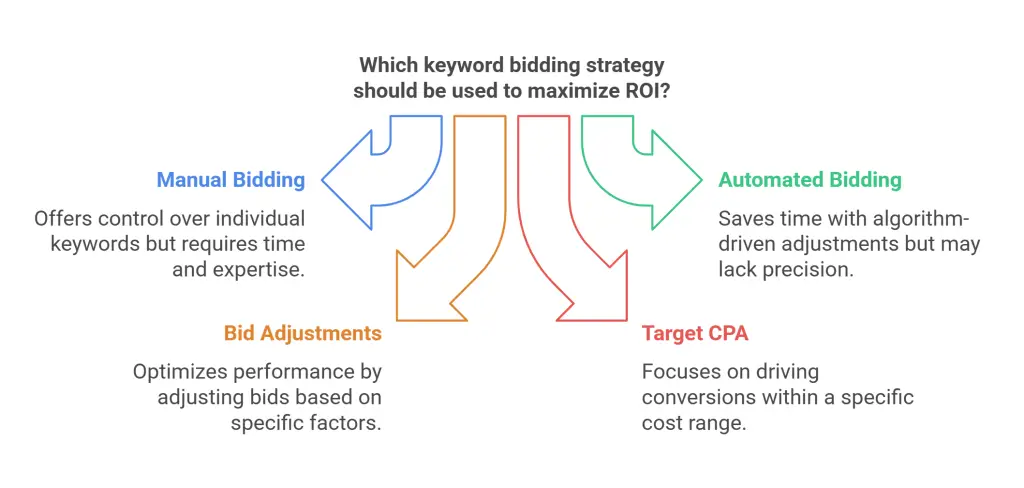
Case Study: Giovanni’s Fish Shop
Background
Giovanni’s fish shop, known for its fresh and high-quality seafood, primarily relied on walk-in customers and word-of-mouth referrals. Realizing the potential to reach a broader audience, Giovanni decided to explore online advertising to attract more customers looking for premium seafood in his area.

Challenges
- Limited Online Presence: With no prior digital marketing efforts, Giovanni’s fish shop had minimal online visibility, making it difficult to attract customers searching for fresh seafood online.
- Competition from Supermarkets: Large grocery stores with significant advertising budgets dominated the search results for seafood-related keywords.
- Budget Constraints: As a small business owner, Giovanni had a limited marketing budget, requiring a cost-effective strategy to maximize return on investment.
Strategy Implementation
To overcome these challenges, Giovanni implemented a targeted PPC campaign focusing on the following key areas:
- Keyword Research and Selection:
- Used tools like Google Keyword Planner to find relevant long-tail keywords such as “fresh fish delivery in [City Name]” and “best seafood near me.”
- Focused on location-based keywords to attract local customers searching for fresh seafood.
- Compelling Ad Copy:
- Created engaging ad copy emphasizing unique selling points like “daily fresh catch,” “local and sustainable seafood,” and “same-day delivery.”
- Used strong calls-to-action (CTAs) like “Order Fresh Fish Now!” to drive immediate engagement.
- Geo-Targeting and Budget Management:
- Enabled geo-targeting to ensure ads were displayed only to potential customers within a specific delivery area.
- Set up a manageable daily budget to control costs while maximizing local reach.
- Landing Page Optimization:
- Developed a user-friendly landing page showcasing popular seafood selections, customer testimonials, and an easy-to-navigate online ordering system.
- Ensured the landing page was mobile-responsive to cater to users across different devices.
Results
After implementing the PPC campaign, Giovanni’s fish shop saw significant improvements:
- Increased Website Traffic: A 40% increase in website visits from local customers searching for fresh seafood.
- Higher Conversion Rates: A 30% boost in online orders, thanks to targeted ads and an optimized landing page.
- Improved Brand Awareness: Greater visibility in local search results, leading to stronger customer trust and recognition.
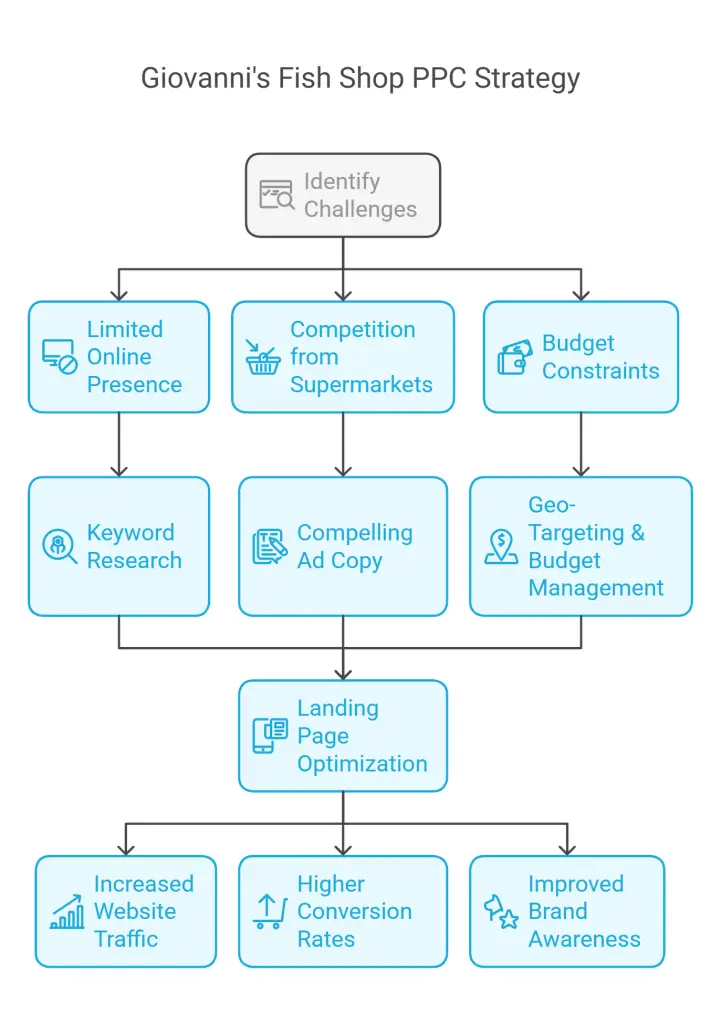
Conclusion
Giovanni’s strategic use of PPC advertising effectively addressed his challenges of limited online presence and competition from larger retailers. By leveraging targeted keywords, engaging ad copy, and precise geo-targeting, he successfully expanded his customer base and increased sales. This case study highlights how small businesses can use digital advertising to achieve substantial growth with a well-planned approach.
Expert Insights: Tips from Industry Leaders
Incorporating insights from industry experts can enhance your understanding of search advertising. Here are some expert tips:
- Continuous Optimization: Neil Patel, a renowned digital marketing expert, emphasizes the importance of continuous optimization. Regularly analyze campaign data, test different ad variations, and refine your strategies to improve performance over time.
- Focus on User Intent: According to Larry Kim, founder of MobileMonkey, focusing on user intent is crucial for successful PPC campaigns. Understanding what users are looking for allows you to create ads and landing pages that align with their needs.
- Leverage AI and Machine Learning: As technology advances, AI and machine learning play a significant role in PPC advertising. Industry leader, Rand Fishkin, advises leveraging these technologies to automate bidding, predict trends, and optimize campaigns for better results.
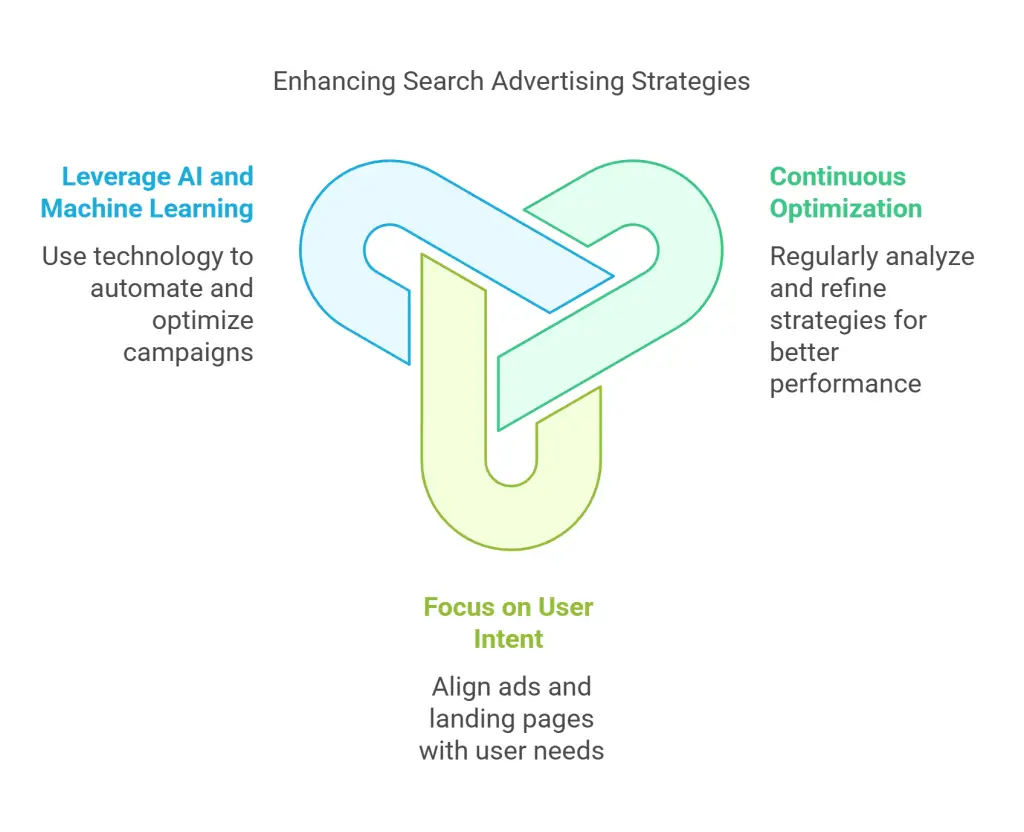
Overcoming Challenges in PPC Campaign Management
While PPC advertising offers numerous benefits, it also presents challenges. Here are some common challenges and solutions:
- Budget Constraints:
- Solution: Start with a small budget and gradually increase as you see positive results. Focus on high-converting keywords and test different strategies to maximize ROI.
- Ad Fatigue:
- Solution: Rotate ad creatives regularly to keep your audience engaged. A/B test different ad variations to determine what resonates best with users.
- Competition and Bid Inflation:
- Solution: Target less competitive long-tail keywords to reduce costs and improve ad positioning. Consider niche markets and unique selling points to stand out from competitors.
- Tracking and Analytics:
- Solution: Use tracking tools like Google Analytics to monitor campaign performance. Set up conversion tracking to measure the effectiveness of your ads and identify areas for improvement.
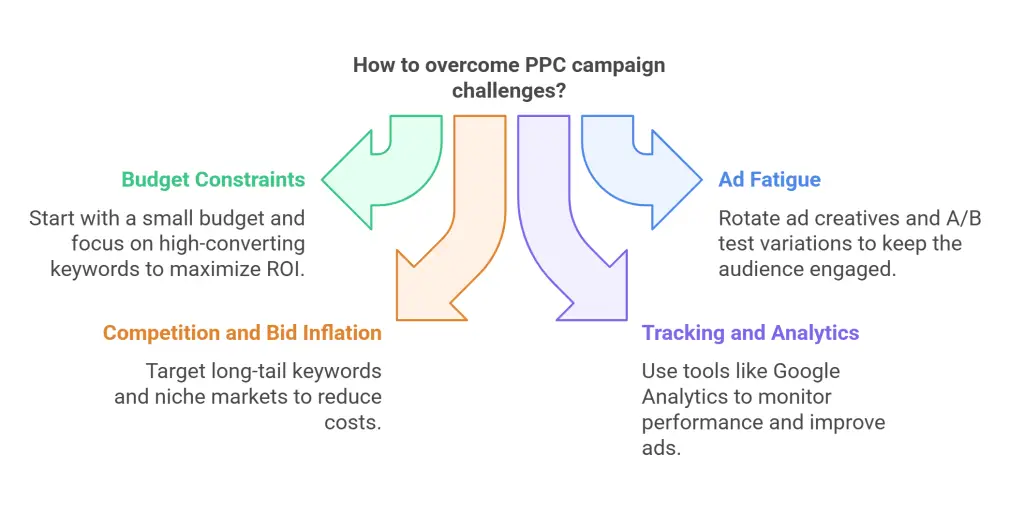
Conclusion
Search advertising, when executed effectively, can be a game-changer for businesses seeking to enhance their online visibility and drive growth. By mastering PPC campaigns, keyword bidding strategies, and ad campaign management, small business owners, entrepreneurs, and marketers can achieve their goals.
As you embark on your search advertising journey, remember the importance of continuous optimization, data-driven decision-making, and staying informed about industry trends. With the right approach, you can maximize your ROI, reach your target audience, and propel your business to new heights.
Further reading
Google Ads. “Keyword Planner.” Last accessed February 7, 2025. https://support.google.com/google-ads/answer/2472712?hl=en-AU.
YouTube. “PPC Keyword Research Tutorial.” Last accessed February 7, 2025. https://www.youtube.com/watch?v=W2nDyCY0-ZM.
WordStream. “PPC Keyword Research Guide.” Last accessed February 7, 2025. https://www.wordstream.com/blog/ws/2013/11/21/ppc-keyword-research-guide.
YouTube. “Advanced PPC Keyword Research Strategies.” Last accessed February 7, 2025. https://www.youtube.com/watch?v=sJ7ez_4qoqk.
SEMrush. “Keyword Bidding Strategies for PPC Campaigns.” Last accessed February 7, 2025. https://www.semrush.com/blog/keyword-bidding/.







